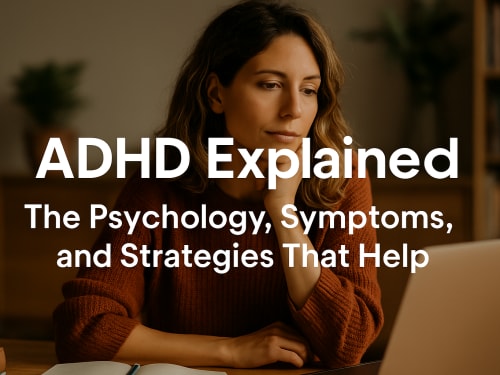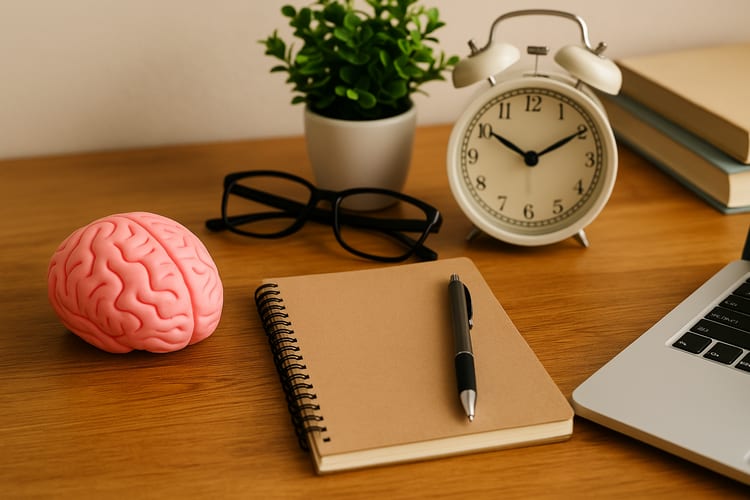ADHD Explained: The Psychology, Symptoms, and Strategies That Help

posted 16th October 2025

ADHD Explained: The Psychology, Symptoms, and Strategies That Help
💭 What Is ADHD?
According to the DSM-5, Attention Deficit Hyperactivity Disorder (ADHD) is a neurodevelopmental condition that affects the brain’s ability to focus, manage impulses, and regulate energy levels. It’s not about being lazy or unfocused — it’s about the brain functioning differently.
ADHD often appears through three key types of symptoms:
- 🧠Inattention– difficulty staying focused, getting easily distracted, or struggling to stay organised.
- ⚡Hyperactivity – restlessness, constant fidgeting, or feeling “on the go.”
- 💬Impulsivity – acting before thinking, interrupting, or finding it hard to wait your turn.
To be diagnosed, these patterns must be consistent, appear in more than one area of life (like home, work, or school), and have a real impact on daily functioning.
🔍 The Different Types of ADHD
Not everyone with ADHD experiences it the same way. The DSM-5 recognises three main types, depending on which symptoms stand out most:
🧠 1. Inattentive Type
This form mainly affects focus and organisation. People may lose things easily, forget details, or “zone out” during conversations. It’s sometimes called “quiet ADHD” — often under-recognised in adults and girls.
⚡ 2. Hyperactive-Impulsive Type
This type includes excessive movement, talking, or acting before thinking. Individuals may interrupt others or struggle to stay still for long periods.
⚖️ 3. Combined Type
A mix of both inattentive and hyperactive symptoms — this is the most common form among children and adults.
💬 How ADHD Affects Daily Life
ADHD influences attention, motivation, and self-control, not from lack of effort, but because the brain processes information differently. Here’s how it often shows up:
📚 At school or university:
Trouble focusing in lessons, losing track of instructions, or struggling with organisation and time management.
💼 At work:
Difficulty prioritising tasks or meeting deadlines. Energy may swing between bursts of focus and burnout.
💬 In relationships:
Interrupting, forgetting plans, or feeling misunderstood — even with the best intentions.
🧩 Emotionally:
Frustration, stress, or low self-esteem from trying hard but feeling inconsistent.
🧠 The Science Behind ADHD
ADHD isn’t a behavioural issue, it’s neurological.
Research shows key differences in how the ADHD brain develops and communicates:
🧭 Executive function:
The prefrontal cortex — responsible for planning, focus, and decision-making — often develops more slowly, making time management and organisation more difficult.
⚡ Dopamine and reward pathways:
Lower dopamine levels affect motivation and reward sensitivity, making it harder to start or persist with unstimulating tasks.
🔗 Neural communication:
Differences in how brain networks connect can impact focus, impulse control, and emotional regulation.
Understanding ADHD as a brain-based condition helps shift the conversation from blame to support.
🌿 Coping Strategies and Psychotherapy for ADHD
Managing ADHD isn’t about fixing yourself — it’s about finding what works for your brain. Psychotherapy, especially Cognitive Behavioural Therapy (CBT), can help build structure, confidence, and emotional regulation.
🧠 1. Cognitive Behavioural Therapy (CBT)
CBT helps reduce impulsivity, procrastination, and negative self-talk. It teaches practical tools for organisation and emotional control — turning frustration into structure.
💬 2. Coaching and Skill Support
ADHD coaching provides accountability and helps turn goals into daily habits. It’s about translating insight into real-world change.
🪞 3. Mindfulness and Acceptance
Mindfulness-based therapies (like MBCT or ACT) calm racing thoughts and increase focus by helping people respond — not react — to distraction.
💊 4. Combined Treatment
Many benefit from combining therapy with medication such as methylphenidate or lisdexamfetamine. These help regulate dopamine levels and support focus.
🌱 5. Lifestyle Strategies
Daily structure matters — consistent sleep, exercise, and nutrition all support focus and reduce stress. Breaking large tasks into smaller ones can make progress feel achievable.
With the right combination of therapy, structure, and self-compassion, ADHD can be managed effectively — helping individuals thrive at school, at work, and in relationships.





